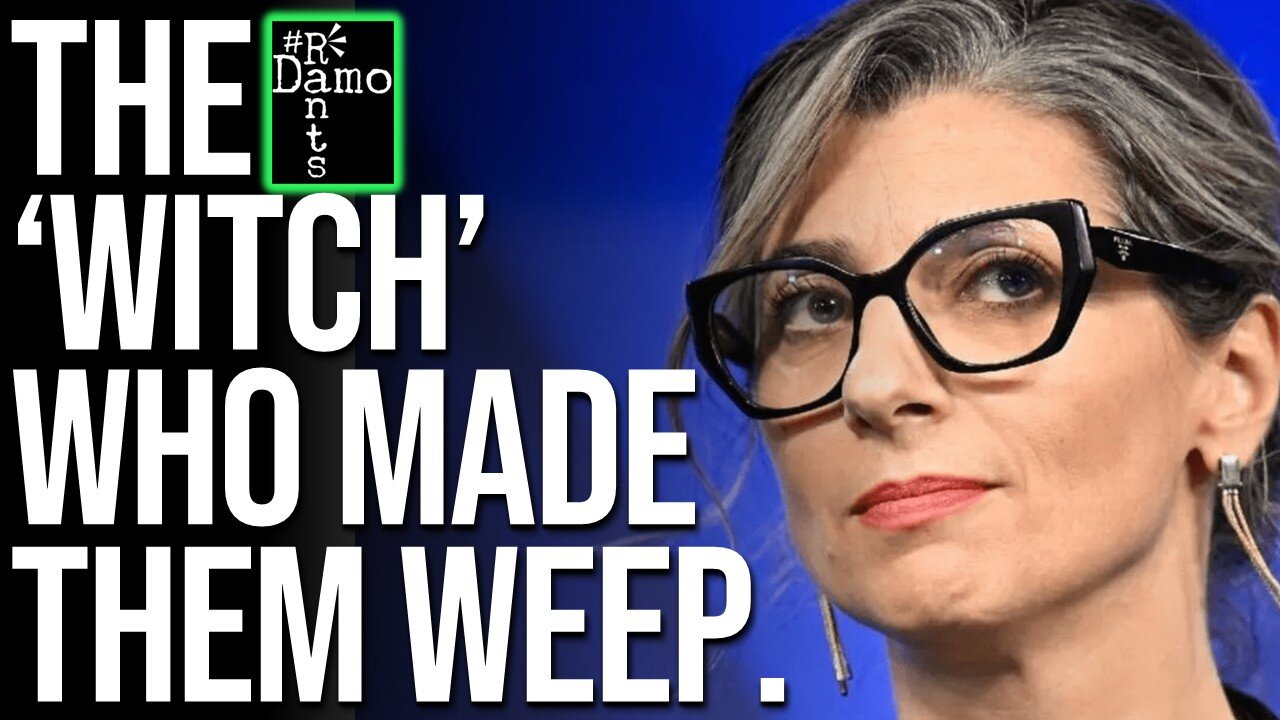Premium Only Content

Israel’s Envoy Called Her a Witch. Big Mistake.
Right, so Israel has spent the last two years telling the world its war on Gaza was “self-defence.” Well Francesca Albanese read their evidence and has summarily torn that story to shreds. In her report Gaza Genocide: A Collective Crime, she didn’t bother with slogans — she showed how the genocide is bankrolled, armed, and excused by the same governments claiming to uphold international law. The United States supplies two-thirds of Israel’s weapons. Germany and Britain keep the rest flowing. The EU keeps trading. Egypt seals the border. And when she laid those facts out at the UN, Israel’s envoy Danny Danon couldn’t refute a single one. So he called her a “witch.” She replied that if she had that kind of power, she’d use it to stop their crimes. The mic drop moment. That’s the story now — Israel’s excuses collapsing under evidence it can’t erase and a UN lawyer who won’t be silenced. She’s the witch they can’t burn.
Right, so the United States hosts the United Nations. But due to sanctions, it has banned one of its own investigators.
Francesca Albanese was meant to walk into the General Assembly chamber in New York, sit down behind the UN crest, and present her report on Gaza. Instead, she had to do it from Cape Town, because Washington had sanctioned her. Assets frozen, visa cancelled, entry barred. That’s the price she is personally paying for doing her job. A UN rapporteur banned from UN headquarters by the government that’s supposed to guarantee her access. That isn’t an oversight. That’s the host turning the institution into private property. The UN remaining on US soil is frankly a farce, but that’s another story.
Albanese’s report, Gaza Genocide: A Collective Crime, runs twenty-four pages and it doesn’t deal in adjectives, it doesn’t mince its words. It lists the states that keep Israel’s war going. Sixty-three of them. She calls it a “collective crime” because genocide of this scale doesn’t run on one country’s resources. It needs partners — arms, money, cover, and silence and goodness knows we know Israel could never stand up on its own and do what it is getting away with. The United States sits at the centre of that network, supplying about two-thirds of Israel’s total arms imports. Germany follows as the second-largest exporter, delivering hardware even after warnings from humanitarian agencies. Britain has flown more than six-hundred surveillance sorties over Gaza. The European Union remains Israel’s top trading partner while sanctioning Russia. Egypt still trades energy and keeps Rafah sealed. Arab governments that normalised relations with Israel carried on doing business while Gaza was being erased. These are not interpretations. They are recorded transactions, export licences, and diplomatic correspondence.
Albanese presented all of it on 28 October. The General Assembly watched by video link as she sat in front of a plain wall in South Africa, just a picture of Desmond Tutu behind her, the state taking Israel to the International Court of Justice for genocide. So the symbolism was particularly apt: a UN expert exiled from New York, giving evidence from the jurisdiction still willing to say “genocide” out loud. South Africa’s government had offered her a platform because the US sanctions made entry to UN territory impossible. She spoke for twenty minutes, listing supply chains, vetoes, and aid diversions. When she finished, Israel’s representative, the execrable Danny Danon, took the floor:
He didn’t address a single number. He called her a “witch.” Said she had a “spellbook.” Resorted to petty insults and childishness.
It was a moment of exposure: a nuclear-armed state reduced to playground abuse because a lawyer read its export data into the record. Albanese answered once. If she really had that kind of power, she said, she’d use it to stop Israel’s crimes. Then she logged off after shoving the phrase from the river to the sea down Danon’s smug throat. No dramatics. Just facts, and delivered despite being under sanction. That calm response is why the insult matters. It shows who lost actually lost control. You can’t argue with data, so you attack the messenger. You can’t stop a report from being published, so you block the author’s travel.
The structure behind it is simple. The United States holds host-state status for the UN under the 1947 Headquarters Agreement. That agreement obliges Washington to grant entry to UN officials on duty. In July 2025 the Treasury Department issued sanctions against Albanese, citing alleged antisemitism and bias. The measure froze any assets under US jurisdiction and imposed a travel ban. The effect was to break the host-state obligation. A UN official could no longer access UN premises and the UN has just accepted it. The European Union said it “deeply regrets” the decision — the kind of phrase Brussels uses when it knows it’s watching a precedent it can’t defend. Albanese described the sanctions as “an assault on the UN itself — on its independence, its integrity, its very soul.” That quote is verifiable. It summed up the problem in one line.
What collapsed in that moment wasn’t just diplomatic etiquette; it was the illusion that the UN’s moral centre and its physical host were the same thing. When the host decides which investigators can enter the building, the building stops being neutral ground. The institution survives only if the work moves elsewhere. That’s why she spoke from Cape Town — a legal workaround and a political message at the same time.
The report itself doesn’t need advocacy; the numbers do the talking. Two-thirds of Israel’s arms from the United States means the United States controls whether the genocide continues or ends. Germany’s place as second-largest exporter means Europe’s industrial base feeds the same supply line. Six-hundred surveillance flights from Britain mean operational support for targeting and damage assessment. EU trade flows keep Israel solvent while the EU sanctions its enemies elsewhere. Egypt’s closed crossing and energy deals mean the siege stays intact. Arab normalisation keeps the diplomatic oxygen flowing. Together they form the logistics of a collective global crime.
That structure explains the fury that met Albanese. But she didn’t accuse; she demonstrated. She presented evidence, as a lawyer that is her stock in trade. Every state she mentioned could be traced through customs data, parliamentary disclosures or UN voting records. The reaction wasn’t about what she got wrong. It was about what she confirmed.
In Germany, Friedrich Merz had taken over as chancellor back in May. His government kept the line of “Israel’s security is non-negotiable.” Defence Minister Boris Pistorius oversaw arms transfers already licensed under previous administrations. Those shipments continued throughout the Gaza campaign. In Britain, Keir Starmer’s government maintained arms export licences and confirmed RAF surveillance missions. Officials described them as “monitoring” flights, but the number — over six-hundred of them — tells its own story. In Washington, Donald Trump and Secretary of State Marco Rubio were responsible for vetoes that blocked every Security Council resolution calling for a ceasefire and the Biden administration before them. In Brussels, the EU’s executive leadership maintained Israel’s trade privileges even as the ICJ called the situation plausibly genocidal. In Cairo, President Abdel Fattah el-Sisi’s government kept Rafah closed and deepened energy coordination with Israel, signing off the biggest gas deal in Israel’s history to become a middle man supplying gas to Europe so they can turn Putin’s taps off. None of these points are speculation; they are drawn from the same reporting that covered the presentation.
No Western government has produced data disproving any of those figures. Not one.
When Danon called her a witch, that was an act of weakness. It said more about his state’s panic than her bias. He couldn’t answer the data, so he went for the smear. That tactic is older than time, let alone the UN itself: when facts breach the propaganda wall, switch to insult. But the insult backfired. It looked like what it was — a diplomat unravelling in front of colleagues because the evidence was unanswerable and he was clearly reading that drivel from a pre-prepared script! He must have been so pleased with himself, only for Albanese to nad him his backside in her off the cuff response. That’s the humiliation that stays in the record and sticks in people’s minds. Israel got served a hefty dose of humiliation and deserved every last drop of it.
From there, the story moved past personalities into the structure of control. The sanctions didn’t just target Albanese; they warned every other special rapporteur what happens if you put the wrong states in your data tables. Cross Washington or Jerusalem and you’ll lose your visa, your access, maybe your income. That’s not regulation; that’s coercion. And it cuts directly across the principle of sovereignty the UN is supposed to defend. An investigator tasked with protecting an occupied people was punished by the occupying power’s patron. The host state criminalised the institution’s own investigator. No spin changes that fact.
The cost was personal as well as institutional. The sanctions meant Albanese’s bank accounts were flagged in compliance systems. They also restricted travel to the country where her child — an American citizen — was born. The punishment extended beyond her job into her private life. It’s in the reporting because it matters: it shows what price is set for using the word “genocide” in an official UN document when applied to Israel. That’s the deterrent effect the sanctions were built to send.
The Western reaction followed its usual script despite Danon getting destroyed. Governments accused her of bias but didn’t challenge her arithmetic. Media sympathetic to Israel framed her report as inflammatory but quoted no factual errors. The talking point became her tone, not her data. It’s the same displacement used whenever documentation makes denial impossible. Attack style to avoid substance. But the figures stand. Sixty-three states. Two-thirds of arms. Second-largest supplier. Six-hundred flights. Top trading partner. Closed crossing. Energy coordination. No amount of press management alters that.
This is why her report marks a shift. It’s not another round of accusations; it’s an audit. Once those numbers are in the UN’s filing system, they can be cited in courts, parliaments, export reviews and NGO submissions. The work has already left the realm of narrative. It’s now a matter of record. It is evidence.
By the time she spoke from Cape Town, the Global South was already treating her as credible. South Africa’s government referenced her findings in its ICJ filings. Several Global South delegations publicly expressed support for her findings during the debate, according to UN webcast footage of the session. Western news barely mentioned them. But they show where legitimacy has migrated. The conscience of the UN has moved south because that’s where it can still speak.
Albanese ended her statement with a summary that stripped the issue down to the system itself:
‘The ongoing genocide in Gaza is a collective crime, sustained by the complicity of influential Third States that have enabled longstanding systemic violations of international law by Israel. Framed by colonial narratives that dehumanize the Palestinians, this livestreamed atrocity has been facilitated through Third States’ direct support, material aid, diplomatic protection and, in some cases, active participation. It has exposed an unprecedented chasm between peoples and their governments, betraying the trust on which global peace and security rest. The world now stands on a knife-edge between the collapse of the international rule of law and hope for renewal. Renewal is only possible if complicity is confronted, responsibilities are met and justice is upheld.’
That sentence ties together the entire evidentiary structure. Genocide as a process requires an ecosystem — suppliers, financiers, defenders and bystanders. The 63-state figure gives that ecosystem shape. It’s a legal argument rendered in numbers.
Washington, Berlin, London and Brussels reacted by pretending the problem was one person. But banning a messenger doesn’t erase the message. The report is stored on UN servers, downloadable by anyone with an internet connection. Every veto, shipment and trade line she referenced sits in a public database. The power to suppress has already failed. The record exists. The only question is who acts on it.
When the envoy called her a witch, it wasn’t comedy. It was the sound of an order cracking. The states that built the UN to manage law are now afraid of its files. Albanese’s calm did more damage than any protest could. She didn’t raise her voice; she raised the record. And in that silence, the facts spoke for themselves.
The silence after that UN session said more than the insults did. No Western government touched her data. No ministry offered a counter-figure. They all knew the numbers weren’t hers to invent — they came from their own paperwork. Arms contracts, trade ledgers, export filings, veto records. It’s hard to argue with your own archives.
That’s what made this report different. Gaza Genocide: A Collective Crime isn’t a moral appeal; it’s an administrative autopsy. It shows how the killing is budgeted, licensed, insured and protected. It documents how sixty-three governments didn’t just look away — they serviced the machine. The United States provides the majority of the hardware. Germany supplies the rest. Britain’s flights fill in the intelligence gaps. The European Union funds the market. Egypt maintains the choke point. Each role is measurable. Together they make the genocide possible.
That phrase — “collective crime” — carries a specific legal meaning. Under the Genocide Convention, a state that aids or assists another state in committing genocide shares responsibility. There’s no exemption for allies or for good intentions. If you arm or fund a genocidal campaign after knowing it’s happening, you’re part of it. That’s not rhetoric; it’s case law. When Albanese used the term, she wasn’t being poetic. She was reading the law back to the governments that literally wrote it.
The impact landed hard in Europe. Germany, Britain and the European Union were all explicitly named for continuing arms and trade despite the International Court of Justice finding the risk of genocide “plausible.” Berlin’s political class closed ranks. The government repeated that Israel’s security was part of Germany’s reason for existence — a statement of doctrine, not evidence. London said its arms exports were “defensive” and “consistent with humanitarian law.” Brussels stayed silent. None of them denied the transactions. None of them explained why legality applied in Ukraine but not in Gaza rubber stamping not just illegality but objective hypocrisy.
In Washington the reaction was even uglier. Marco Rubio went after Albanese personally, he really ought to have looked at what she did to Danny Danon before going there. He accused her of “inciting antisemitism” and “spreading hate.” The Treasury sanctions stayed in place. The point wasn’t to win an argument; it was to make an example.
Albanese’s restraint has become her weapon though. She doesn’t shout. She lists. She shows the export data, the veto count, the trade tables, the famine indicators. She names states in categories: arms, finance, diplomacy, aid manipulation. Each one builds a record of complicity that no amount of PR can scrub. That’s why Danon bleated “witch” at her. Because he and his state had nothing left.
The moral panic around her person has become evidence of the very complicity she outlined. Every defamation campaign, every column calling her biased, every social-media smear adds another exhibit to the file marked “intimidation of UN officials.” They can’t see it, but they’re writing their own footnotes.
What happens next will decide whether law still has meaning in an order run by its violators.
Of course where the UK is concerned they might now be implicated in not one genocide but two and worse, both of them might actually be linked. Surveillance flights over Gaza is one thing, but British arms are now turning up in Sudan and all as a secret supply route through Sudan to Israel has been exposed at the same time. Get all the details of that story in this video recommendation here as your suggested next watch.
Please do also hit like, share and subscribe if you haven’t done so already so as to ensure you don’t miss out on all new daily content as well as spreading the word and helping to support the channel at the same time which is very much appreciated, holding power to account for ordinary working class people and I will hopefully catch you on the next vid. Cheers folks.
-
 19:12
19:12
Robbi On The Record
10 hours ago $16.92 earnedThe Loneliness Epidemic: AN INVESTIGATION
48.3K80 -
 14:45
14:45
Mrgunsngear
1 day ago $101.39 earnedFletcher Rifle Works Texas Flood 30 Caliber 3D Printed Titanium Suppressor Test & Review
89.7K21 -
 17:17
17:17
Lady Decade
1 day ago $6.12 earnedMortal Kombat Legacy Kollection is Causing Outrage
54.8K9 -
 35:51
35:51
Athlete & Artist Show
1 day ago $11.13 earnedIs Ryan Smith The Best Owner In The NHL?
75.8K7 -
 22:56
22:56
American Thought Leaders
2 days agoCharles Murray: I Thought Religion Was Irrelevant to Me. I Was Wrong.
64.6K32 -
 36:22
36:22
Brad Owen Poker
11 hours agoGIGANTIC $17,000+ Pot In BOBBY’S ROOM! TRAPPING Top Pro w/FULL HOUSE!! Big Win! Poker Vlog Ep 326
71.1K4 -
 3:53
3:53
GreenMan Studio
1 day agoRUMBLE RUNDOWN: DREAM HACK SPECIAL W/Greenman Reports
58.3K10 -
 1:28
1:28
Damon Imani
2 days agoThey Laughed at Trump’s Cognitive Test — Damon Made Them REGRET It!
56.8K37 -
 9:14
9:14
Freedom Frontline
1 day agoAdam Schiff PANICS As Eric Schmitt Exposes His Dirty Lies LIVE
38.2K81 -
 10:32
10:32
GBGunsRumble
1 day agoGBGuns Armory Ep 153 Adler Arms AD-9`
25.6K2